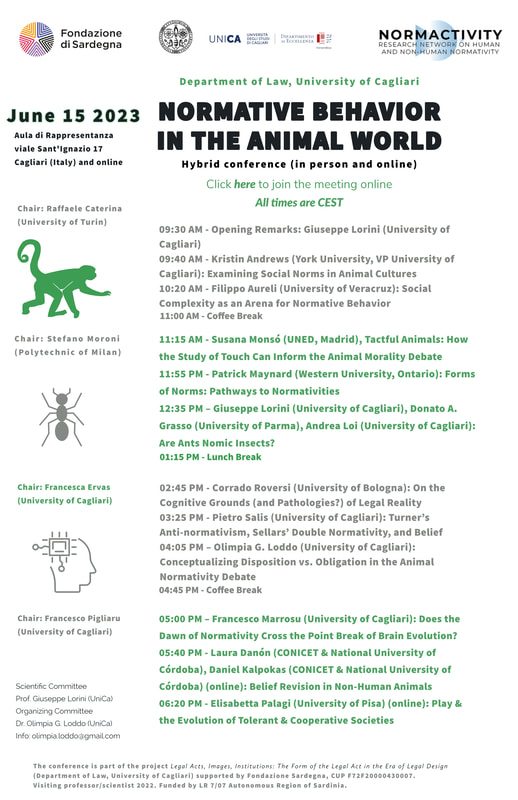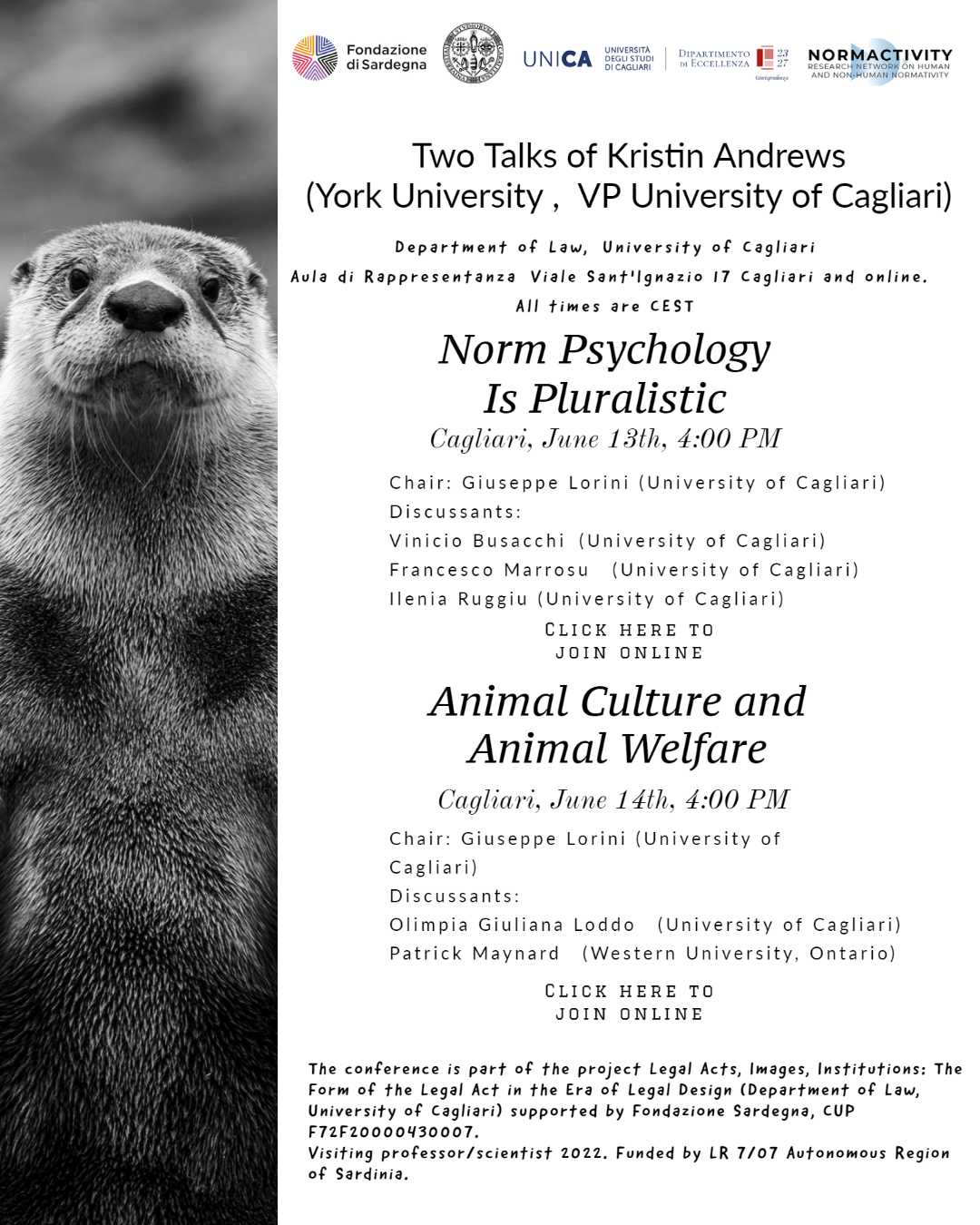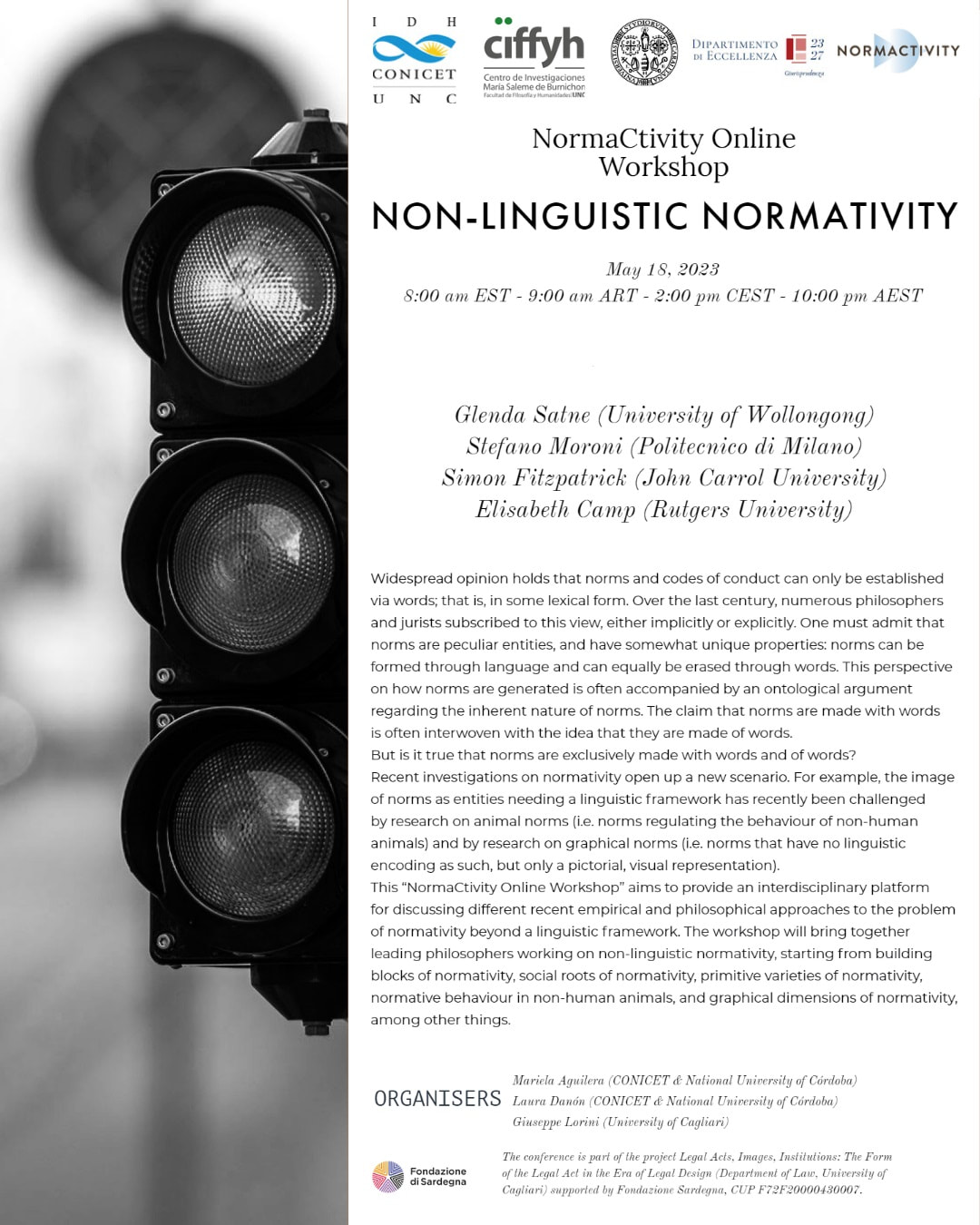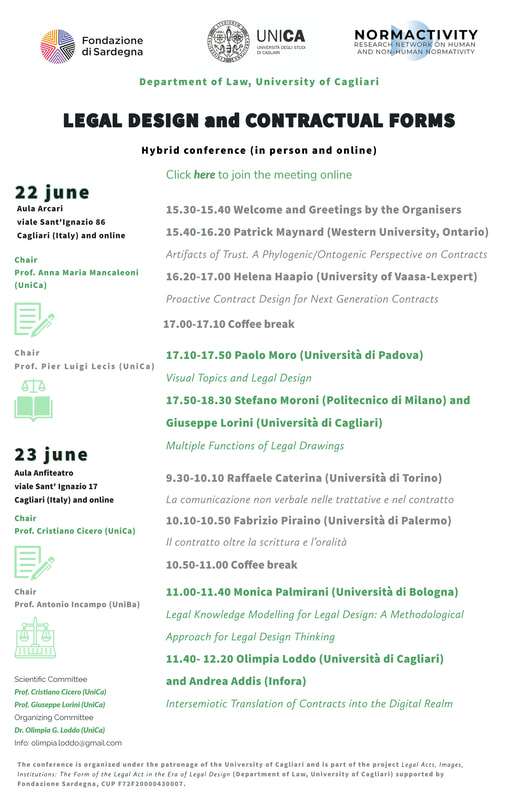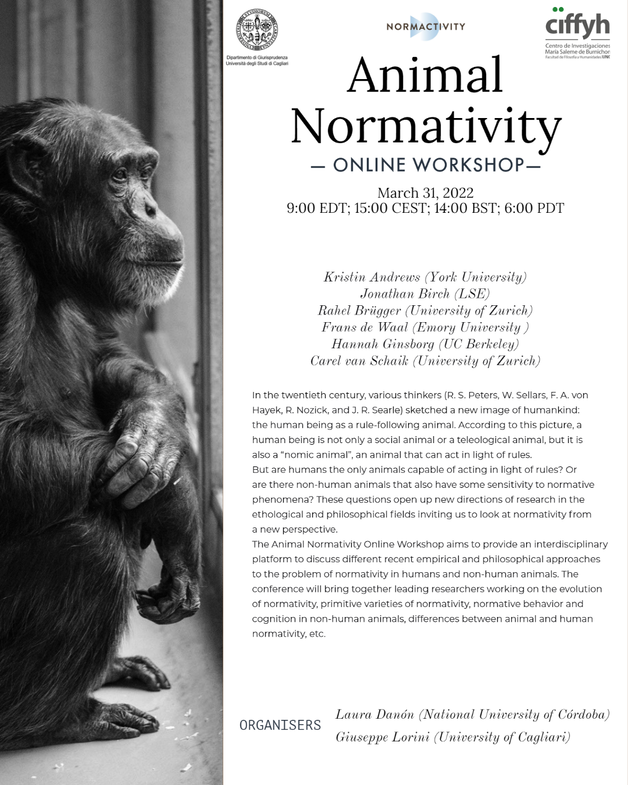|
Normative Behavior in the Animal World (Hybrid conference-in person and online) Organizers Scientific committee Giuseppe Lorini (University of Cagliari) Organizing committee Olimpia G. Loddo (University of Cagliari) Info: [email protected] Speakers Kristin Andrews (York University, VP University of Cagliari) Filippo Aureli (University of Veracruz) Susana Monsó (UNED, Madrid) Patrick Maynard(Western University, Ontario) Giuseppe Lorini (University of Cagliari) Donato A. Grasso (University of Parma) Andrea Loi (University of Cagliari) Corrado Roversi (University of Bologna) Pietro Salis (University of Cagliari) Olimpia G. Loddo (University of Cagliari) Francesco Marrosu (University of Cagliari) Laura Danón (CONICET & National University of Córdoba) Daniel Kalpokas (CONICET & National University of Córdoba) Elisabetta Palagi (University of Pisa) |
|
|
|
|
|
|
|
Two Talks of Kristin Andrews
All times are CEST Norm Psychology Is Pluralistic Cagliari, June 13th, 4:00 PM Chair Giuseppe Lorini (University of Cagliari) Discussants Vinicio Busacchi (University of Cagliari) Francesco Marrosu (University of Cagliari) Ilenia Ruggiu (University of Cagliari) Animal Culture and Animal Welfare
Cagliari, June 14th, 4:00 PM Chair Giuseppe Lorini (University of Cagliari) Discussants Olimpia Giuliana Loddo (University of Cagliari) Patrick Maynard (Western University, Ontario) |
|
|
|
|
|
Non-Linguistic Normativity - Online Workshop
May 18, 2023 8:00 am EST - 9:00 am ART - 2:00 pm CEST - 10:00 pm AEST Organizers Mariela Aguilera (CONICET & National University of Córdoba) Laura Danón (CONICET & National University of Córdoba) Giuseppe Lorini (University of Cagliari) Speakers Glenda Satne (University of Wollongong) Stefano Moroni (Politecnico di Milano) Simon Fitzpatrick (John Carrol University) Elisabeth Camp (Rutgers University) Widespread opinion holds that norms and codes of conduct can only be established via words; that is, in some lexical form. Over the last century, numerous philosophers and jurists subscribed to this view, either implicitly or explicitly. One must admit that norms are peculiar entities, and have somewhat unique properties: norms can be formed through language and can equally be erased through words. This perspective on how norms are generated is often accompanied by an ontological argument regarding the inherent nature of norms. The claim that norms are made with words is often interwoven with the idea that they are made of words. But is it true that norms are exclusively made with words and of words? Recent investigations on normativity open up a new scenario. For example, the image of norms as entities needing a linguistic framework has recently been challenged by research on animal norms (i.e. norms regulating the behaviour of non-human animals) and by research on graphical norms (i.e. norms that have no linguistic encoding as such, but only a pictorial, visual representation). This “NormaCtivity Online Workshop” aims to provide an interdisciplinary platform for discussing different recent empirical and philosophical approaches to the problem of normativity beyond a linguistic framework. The workshop will bring together leading philosophers working on non-linguistic normativity, starting from building blocks of normativity, social roots of normativity, primitive varieties of normativity, normative behaviour in non-human animals, and graphical dimensions of normativity, among other things. |
|
|
|
|
|
|
Legal Design and Contractual Forms - Hybrid conference
Organizers Scientific committee Giuseppe Lorini (University of Cagliari) Cristiano Cicero (University of Cagliari) Organizing committee Olimpia G. Loddo (University of Cagliari) Speakers Patrick Maynard (Western University, Ontrario) Helena Haapio (Unversity of Vaasa-University of Lapland-Lexpert Ltd) Paolo Moro (University of Padova) Stefano Moroni (Polytechnic University of Milan) Giuseppe Lorini (University of Cagliari) Raffaele Caterina (University of Turin) Fabrizio Piraino (University of Palermo) Monica Palmirani (University of Bologna) Olimpia Loddo (University of Cagliari) Andrea Addis (Infora) |
|
|
|
|
|
Animal Normativity - Online Workshop
Organizers Laura Danon (National University of Cordoba) Giuseppe Lorini (University of Cagliari) Speakers Kristin Andrews (York University) Jonathan Birch (LSE, London) Rahel Brugger (University of Zurich) Frans de Waal (Emory University) Hannah Ginsborg (UC, Berkeley) Carel van Schaik (University of Zurich) In the twentieth century, various thinkers (R. S. Peters, W. Sellars, F. A. von Hayek, R. Nozick, and J. R. Searle) sketched a new image of humankind: the human being as a rule-following animal. According to this picture, a human being is not only a social animal or a teleological animal, but it is also a “nomic animal”, an animal that can act in light of rules. But are humans the only animals capable of acting in light of rules? Or are there non-human animals that also have some sensitivity to normative phenomena? These questions open up new directions of research in the ethological and philosophical fields inviting us to look at normativity from a new perspective. The Animal Normativity Online Workshop aims to provide an interdisciplinary platform to discuss different recent empirical and philosophical approaches to the problem of normativity in humans and non-human animals. The conference will bring together leading researchers working on the evolution of normativity, primitive varieties of normativity, normative behavior and cognition in non-human animals, differences between animal and human normativity, etc. |
|
|
|
|
|

